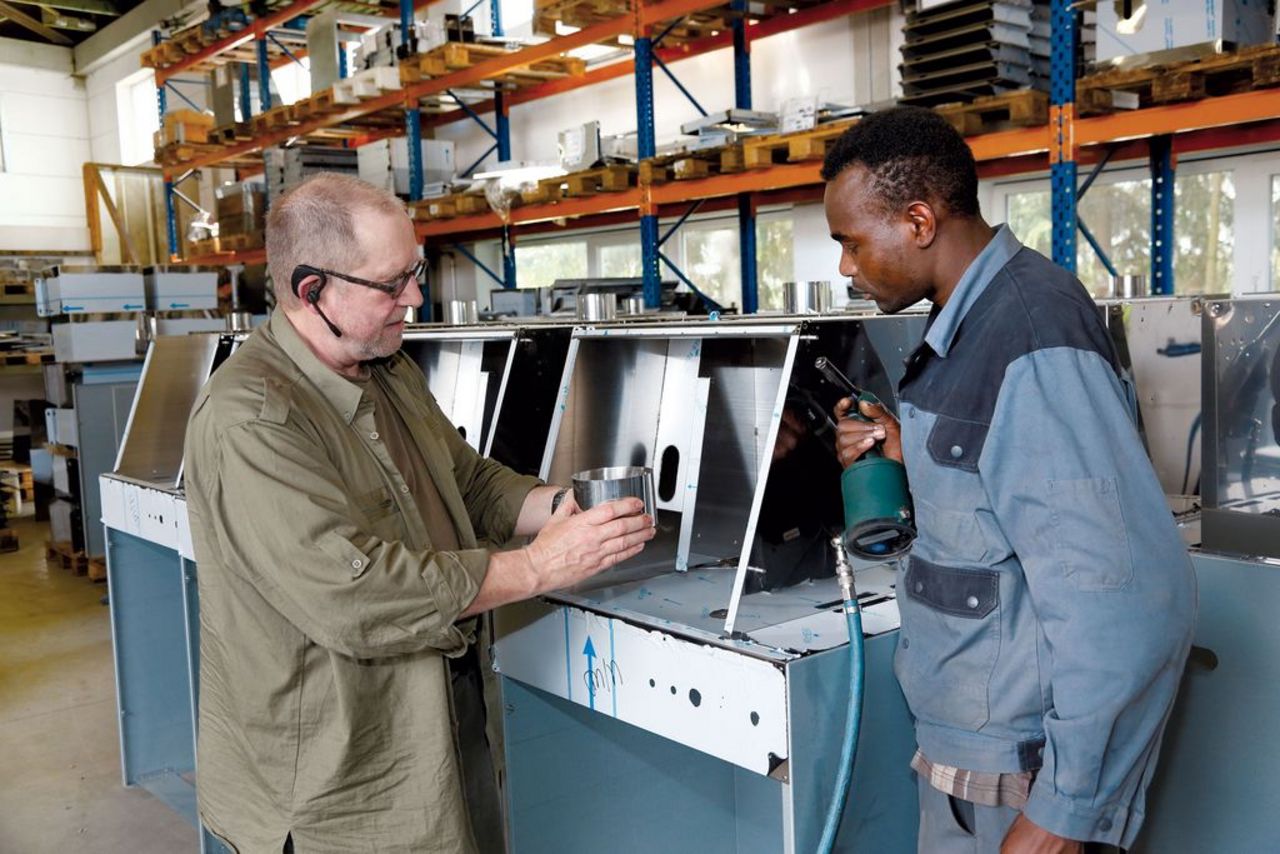Project
Refugees in Rural Areas

Migration and integration research in Germany has so far been largely focused on big cities. However, as a result of refugee development since 2014, small towns and villages in rural areas are increasingly being confronted with refugee assistance and integration tasks.
Background and Objective
Some local communities in rural areas see refugee-based immigration not only as a humanitarian task but also as a chance for development in the context of emigration, aging, and skills shortages. However, empirically based answers how this can be achieved are still lacking.
The research project aims to examine in detail under which conditions, and how humanitarian engagement, and rural development can be successfully linked, and how this can be positively influenced by politics and civil society.
The project will examine rural districts in Bavaria, Hesse, Lower Saxony and Saxony, distinguishing four dimensions:
- Integration potential of rural areas in Germany (Thünen Institute),
- Perspective of the refugees (Friedrich-Alexander-University Erlangen-Nürnberg),
- Local integration policy and its support by the federal, state and EU (University Hildesheim), and
- Civic engagement and the attitude of the host society (TU Chemnitz).
Target Group
Professional public, political decision-makers
Approach
A correspondingly broad-based project is based on the expertise of various research institutions and disciplines. In detail, these are the Thünen Institute of Rural Studies (responsibility for subproject 1 and the study regions in Lower Saxony), the University of Erlangen (subproject 2 and Bavaria), the University of Hildesheim (subproject 3 and Hessen) and the TU Chemnitz (subproject 4 and Saxony). Following up on the research results of the four dimensions and based on regional profiles, policy recommendations are formulated (subproject 5). The Thünen Institute coordinates the joint project.
A project advisory council from research and practice, will support the project progress and discuss the results to ensure the connection to the political practice in the areas of integration and rural development.
Results
Results of the project are published in the following publications and can be found on the project website www.gefluechtete-in-laendlichen-raeumen.de/infothek/publikationen/
A summary you can find in the project brief.
Links and Downloads
Thünen-Contact

Involved Thünen-Partners
Involved external Thünen-Partners
- Technische Universität Chemnitz
(Chemnitz, Deutschland) - Friedrich-Alexander-Universität Erlangen-Nürnberg
(Erlangen-Nürnberg, Deutschland) - Stiftung Universität Hildesheim
(Hildesheim, Deutschland)
Funding Body
-
Federal Ministry of Food und Agriculture (BMEL)
(national, öffentlich)
Duration
1.2018 - 12.2021
More Information
Project funding number: 2817LE035
Funding program: Bundesprogramm Ländliche Entwicklung
Project status:
finished
Publications to the project
- 0
Mehl P, Kordel S, Meschter D, Schneider H, Spenger D, Weidinger T (2023) Alltagsmobilität und Erreichbarkeit: Schlüsselfaktoren für Teilhabechancen und Bleibeorientierungen der Geflüchteten in ländlichen Regionen. In: Mehl P, Fick J, Glorius B, Kordel S, Schammann H (eds) Geflüchtete in ländlichen Regionen Deutschlands. Wiesbaden: Springer VS, pp 161-190, DOI:10.1007/978-3-658-36689-6_7
- 1
Mehl P, Fick J, Glorius B, Kordel S, Schammann H (eds) (2023) Geflüchtete in ländlichen Regionen Deutschlands. Wiesbaden: Springer VS, XVIII, 265 p, SZMI, DOI:10.1007/978-3-658-36689-6
- 2
Mehl P, Fick J, Meschter D, Neumeier S, Osigus T, Glorius B, Bürer M, Gasch S, Schneider H, Kordel S, Spenger D, Weidinger T, Schammann H, Younso C (2023) Geflüchtete in ländlichen Regionen Deutschlands. Braunschweig: Thünen-Institut für Lebensverhältnisse in ländlichen Räumen, 2 p, Project Brief Thünen Inst 2023/22, DOI:10.3220/PB1678958927000
- 3
Schammann H, Fick J, Glorius B, Kordel S, Mehl P (2023) Geflüchtete in ländlichen Regionen: Zentrale Befunde, konzeptionelle Überlegungen und methodische Reflexionen. In: Mehl P, Fick J, Glorius B, Kordel S, Schammann H (eds) Geflüchtete in ländlichen Regionen Deutschlands. Wiesbaden: Springer VS, pp 225-246, DOI:10.1007/978-3-658-36689-6_9
- 4
Fick J, Glorius B, Kordel S, Mehl P, Schammann H (2023) Integration von Geflüchteten: Herausforderungen und Potenziale für ländliche Räume. In: Mehl P, Fick J, Glorius B, Kordel S, Schammann H (eds) Geflüchtete in ländlichen Regionen Deutschlands. Wiesbaden: Springer VS, pp 3-22, DOI:10.1007/978-3-658-36689-6_1
- 5
Mehl P, Neumeier S, Osigus T (2023) Integrationsrelevante Rahmenbedingungen in den Untersuchungslandkreisen und -gemeinden. In: Mehl P, Fick J, Glorius B, Kordel S, Schammann H (eds) Geflüchtete in ländlichen Regionen Deutschlands. Wiesbaden: Springer VS, pp 25-46, DOI:10.1007/978-3-658-36689-6_2
- 6
Mehl P, Fick J, Meschter D, Neumeier S, Osigus T, Glorius B, Bürer M, Gasch S, Schneider H, Kordel S, Spenger D, Weidinger T, Schammann H, Younso C (2023) Refugees in rural areas in Germany. Braunschweig: Thünen Institute of Rural Studies, 2 p, Project Brief Thünen Inst 2023/22a, DOI:10.3220/PB1678959710000
- 7
Fick J (2023) Zukunft für Geflüchtete in ländlichen Räumen? - Vorstellung des multiperspektivischen Forschungsdesigns. In: Agrar- und Ernährungssysteme im Wandel: Chancen und Herausforderungen für Landwirtschaft und ländliche Räume : 33. Jahrestagung der Österreichischen Gesellschaft für Agrarökonomie, Universität für Bodenkultur Wien, 28.-29. September 2023 ; Tagungsband 2023. pp 109-110
- 8
Neumeier S (2021) Durchschnittliche bevölkerungsgewichtete Wegezeit in den Untersuchungslandkreisen und ausgewählten kreiseigenen Gemeinden, differenziert nach Verkehrsträgern, in Minuten [Datenpublikation] [online]. 1 PDF-Datei, 1 EPS-Datei. Göttingen: Open Agrar Repositorium, zu finden in <https://www.openagrar.de/receive/openagrar_mods_00076438> [zitiert am 15.12.2021], DOI:10.3220/DATA20211214150102
- 9
Neumeier S (2021) Pkw-, fußläufige- und Fahrrad-Erreichbarkeit der nächsten Haltestelle des öffentlichen Personenverkehrs in den Untersuchungslandkreisen [Datenpublikation] [online]. 1 JPG-Datei, 1 EPS-Datei. Göttingen: Open Agrar Repositorium, zu finden in <https://www.openagrar.de/receive/openagrar_mods_00076443> [zitiert am 15.12.2021], DOI:10.3220/DATA20211214150321
- 10
Neumeier S (2021) Pkw-, fußläufige- und ÖPNV-Erreichbarkeit des nächsten Jobcenters in den Untersuchungslandkreisen [Datenpublikation] [online]. 1 PDF-Datei, 1 EPS-Datei. Göttingen: Open Agrar Repositorium, zu finden in <https://www.openagrar.de/receive/openagrar_mods_00076442> [zitiert am 15.12.2021], DOI:10.3220/DATA20211214150804
- 11
Fick J, Mehl P, Meschter D, Neumeier S, Osigus T, Kordel S, Spenger D, Weidinger T, Schammann H, Younso C, Bürer M, Gasch S, Glorius B, Schneider H (2021) Regionale Steckbriefe der Untersuchungsregionen im Projekt "Zukunft für Geflüchtete in ländlichen Regionen Deutschlands". Braunschweig: Thünen-Institut für Ländliche Räume, 43 p
- 12
Kraft N, Fick J (2021) Thünen erklärt: Gekommen, um zu bleiben : Wie Integration Geflüchteter in ländlichen Regionen gelingen kann [online]. Braunschweig: Thünen-Institut, zu finden in <https://thuenen.pageflow.io/gekommen-um-zu-bleiben#313014> [zitiert am 14.01.2022]
- 13
Schammann H, Bürer M, Fick J, Gasch S, Glorius B, Kordel S, Mehl P, Meschter D, Neumeier S, Osigus T, Schneider H, Spenger D, Weidinger T, Younso C (2021) Zukunft für Geflüchtete in ländlichen Regionen : Befunde und Handlungsempfehlungen aus einem interdisziplinären Forschungsprojekt ; Ratgeber. Braunschweig: Thünen-Institut für Ländliche Räume, 40 p
- 14
Schammann H, Younso C, Meschter D (2020) Lokale Migrationspolitik in ländlichen Regionen Deutschlands: Ausgangspunkte für empirische Forschung. Braunschweig: Johann Heinrich von Thünen-Institut, 45 p, Thünen Working Paper 142, DOI:10.3220/WP1585900191000
- 15
Glorius B, Bürer M, Schneider H (2019) Integration von Geflüchteten und die Rolle der Aufnahmegesellschaft: Konzeptionelle Überlegungen und ihre Anwendung auf ländliche Räume. Braunschweig: Johann Heinrich von Thünen-Institut, 41 p, Thünen Working Paper 120, DOI:10.3220/WP1550743518000
- 16
Neumeier S (2019) Zukunft für Geflüchtete in ländlichen Regionen Deutschlands - Erreichbarkeit von Einrichtungen der Grundversorgung in den Untersuchungslandkreisen und deren kreiseigenen Gemeinden. Braunschweig: Johann Heinrich von Thünen-Institut, 426 p, Thünen Working Paper 122, DOI:10.3220/WP1558335521000
- 17
Osigus T, Neumeier S, Mehl P (2019) Zukunft für Geflüchtete in ländlichen Regionen Deutschlands - Integrationsrelevante Rahmenbedingungen in den Untersuchungsregionen. Braunschweig: Johann Heinrich von Thünen-Institut, 197 p, Thünen Working Paper 135, DOI:10.3220/WP1576057568000
- 18
Kordel S, Weidinger T, Hachmeister S (2018) Lebenswelten geflüchteter Menschen in ländlichen Regionen qualitativ erforschen : methodische Überlegungen zu einem partizipativ orientierten Forschungsansatz. Braunschweig: Johann Heinrich von Thünen-Institut, 50 p, Thünen Working Paper 106, DOI:10.3220/WP1540817037000
- 19
Garming H, Efken J, Boutsoudine K (2018) Vom Land in die Stadt: Warum ziehen Flüchtlinge nach ihrer Anerkennung um? Landkreis Z Kommunale Selbstverwalt 88(7):379-380
- 20
Garming H, Efken J, Boutsoudine K (2018) Warum ziehen Flüchtlinge nach der Anerkennung vom Land in die Stadt? Ländl Raum (ASG) 69(4):32-35
- 21
Boutsoudine K, Efken J, Garming H (2017) Arbeit finden in Deutschland : Tipps von Flüchtlingen für Flüchtlinge ; Erfahrungen und Empfehlungen aus 21 Betrieben ; Ratgeber. Braunschweig: Thünen-Institut, 27 p
- 22
Mehl P, Meschter D, Neumeier S, Osigus T (2017) Aufnahme und Integration von Geflüchteten: Wo liegen die Spezifika und die größten Herausforderungen für ländliche Räume? - Impulsreferat. Thünen Rep 53:7-24
- 23
Efken J, Garming H (2017) Flüchtlinge einstellen : Tipps von Unternehmern für Unternehmer ; Erfahrungen und Empfehlungen aus 21 Betrieben ; Ratgeber. Braunschweig: Thünen-Institut, 23 p
- 24
Efken J (2017) Integrations- und Bleibeperspektiven für Geflüchtete in ländlichen Räumen: (Was) kann lokale Politik beitragen? (Wie) wird sie von Land, Bund und EU wirkungsvoll unterstützt? : Diskussionsbericht. Thünen Rep 53:87-90
- 25
Mehl P, Meschter D, Neumeier S, Osigus T (2017) Integrationspotenziale ländlicher Räume. Inf Raumentwickl(2):88-99
- 26
Efken J, Garming H, Boutsoudine K (2017) Wie kann Flüchtlingen der Einstieg in den Arbeitsmarkt gelingen? Neue Landschaft 28(11):41-43
- 27
Plankl R, Neumeier S, Osigus T, Küpper P, Mehl P (2016) Indikatoren und Karten zur Darstellung von Potentialen bei der Aufnahme und Integration von Flüchtlingen auf Landkreisebene. Agra Europe (Bonn) 57(16):1-27
- 28
Plankl R, Neumeier S, Osigus T, Küpper P, Mehl P (2016) Indikatoren und Karten zur Darstellung von Potenzialen bei der Aufnahme und Integration von Flüchtlingen auf Landkreisebene. Braunschweig: Johann Heinrich von Thünen-Institut, 77 p, Thünen Working Paper 59, DOI:10.3220/WP1467711761000
- 29
Boutsoudine K, Efken J, Garming H (2016) Zukunft auf dem Lande? B&B Agrar 69(6):13-15

![[Translate to English:] [Translate to English:]](/media/_processed_/2/0/csm_LV_Bei_Hornburg_Quelle_Johanna_Fick_neu_da89674833.jpg)
![[Translate to English:] [Translate to English:]](/media/_processed_/2/0/csm_LV_Bei_Hornburg_Quelle_Johanna_Fick_neu_3aae309567.jpg)
![[Translate to English:] Logo des Bundesministerium für Ernährung und Landwirtschaft](/media/allgemein/logos/BMEL_Logo.svg)